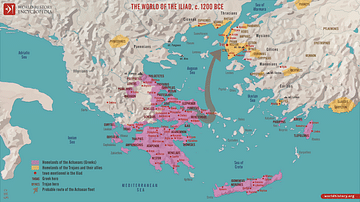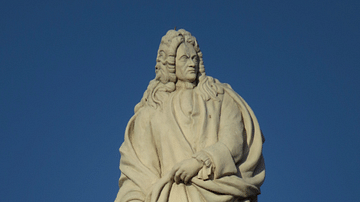Search
Remove Ads
Advertisement
Summary 
Loading AI-generated summary based on World History Encyclopedia articles ...
Search Results

Definition
Gottfried Wilhelm Leibniz
Gottfried Wilhelm Leibniz (1646-1716) was a German polymath who became well-known across Europe for his work, particularly in the fields of science, mathematics, and philosophy. Leibniz's rationalist philosophy attempted to reconcile traditional...

Image
Wilhelm Dörpfeld
German architect and archaeologist Wilhelm Dörpfeld (1853-1940), who excavated Troy with Heinrich Schliemann (1822-1890) and carried on Schliemann's work after his death in 1890.

Article
Discovery of Troy
In his epic poems, the Iliad and the Odyssey, the Greek poet Homer (c. 750 BCE) told the story of the Trojan War, a ten-year siege of the city of Troy by an alliance of Greek city-states. Troy was also known by its Latinised name of Ilium...

Image
Wilhelm Conrad Röntgen
Portrait of W. C. Röntgen after a photograph by Nicola Perscheld, 1906.
Wellcome Collection.

Image
Gottfried Wilhelm Leibniz Portrait
A c. 1700 portrait of Gottfried Wilhelm Leibniz (1646-1716), the German polymath. Painted by Johann Friedrich Wentzel (1670–1729).

Image
Gottfried Wilhelm Leibniz, 1695
A 1695 oil-on-canvas portrait by Christoph Bernhard Francke of Gottfried Wilhelm Leibniz (1646-1716), the German polymath. (Herzog Anton Ulrich Museum, Braunschweig, Germany)

Image
Kaiser Wilhelm Memorial Church, Berlin
The Kaiser Wilhelm Memorial Church, Berlin. The church was damaged in the bombing of Berlin during the Second World War (1939-45) and left as a memorial.

Image
Statue of Gottfried Wilhelm Leibniz
A statue of Gottfried Wilhelm Leibniz (1646-1716), the German polymath. Natural History Museum, Vienna, Austria.

Article
Discovery of X-Rays
The discovery of X-rays – a form of invisible radiation that can pass through objects, including human tissue – revolutionised science and medicine in the late 19th century. Wilhelm Conrad Röntgen (1845-1923), a German scientist, discovered...

Definition
Jeanne d'Albret
Jeanne d’Albret (Joan III of Navarre, l. 1528-1572) was Queen of Navarre, daughter of Marguerite de Navarre (l. 1492-1549) and niece of King Francois I (Francis I of France, r. 1515-1547). She is best known for leading the Huguenots (French...